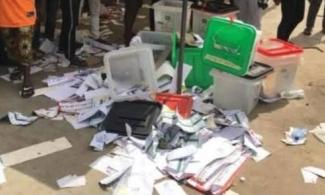Nigeria’s democracy may be undergoing a turbulent period, but the wealth of options it offers Nigerians remain unparalleled.
On October 23, 2023, Nigeria’s Supreme Court reserved judgment in the petition filed by some presidential candidates against the victory of Bola Ahmed Tinubu in the February 25, 2023, polls.
The judgment delivered on Thursday, October 25, 2023, confirmed the election of Tinubu as Nigeria’s sixteenth president.
A new administration was sworn in May 2023 but not a few Nigerians continue to reel from the aftermath of polls they deemed manipulated.
On November 11, in what is a monument to Nigeria’s mammoth electoral struggles, staggered elections are to be held in Imo,Kogi and Bayelsa States.
In Kogi State a battle royale appears afoot between the ruling All Progressives Congress and a new kid on the block, the Social Democratic Party.
The unfortunate circumstances which produced Yahaya Bello as the governor of the state in 2016 are not in the offing this time around as the people’s choice is set to be determined in the ballot box.
Having found dark fortune in the unfortunate death of Prince Abubakar Audu who was on the verge of victory in the governorship polls in 2016, Bello has done two terms.
His time in office has divided opinion, but it is in the way he has attempted to foist a successor on the state that has really rankled many.
His choice of Ahmed Ododo is widely unpopular. This is as opposed to Yakubu Murtala Ajaka who is the candidate of the Social Democratic Party (SDP)
who is now finely poised to snatch victory in the polls.
Whatever happens on November 11, Kogi State deserves a swift change of story and direction from the chaos and circus of the last eight years.
In Imo State, the day of reckoning draws ever near for Governor Hope Uzodinma. Having snatched victory from the laps of the gods of the Supreme Court through an eternally controversial decision of 2019, he has had no compunction wielding an iron fist in the governance of the state.
Arrogant and aggressive, his leadership style which has largely featured sacrificing his people on the altar of good relations with Abuja will face a test of fire on November 11, his outrageous campaign promises notwithstanding.
In Bayelsa State, Duoye Diri, the incumbent Governor, saw an unlikely but fall into his lap in 2016 when the Nigerian Supreme Court invalidated the election of David Lyon who won the Governorship Election in 2015. He has since taken in four years and is seeking another four years.
However, Bayelsans appear to have had enough of him. The fact that he came second in the last election conducted in the state before the Supreme Court intervened speaks loudly for itself.
Given he was the favoured choice of his predecessor, who underwhelmed in office, many Bayelsans cannot wait to get rid of him.
After the farce it registered during the last election, the Independent National Electoral Commission (INEC) has promised to learn from its mistakes in conducting the elections in the three states.
But who is to know lessons have been learned and that INEC will not repeat past mistakes. Were they really even mistakes and not deliberate attempts to alter the choice of the Nigerian electorate?
Can INEC really clean up its acts? Can it sort itself out and take a shot at redeeming its battered image?
Many Nigerians remain sore from what transpired during the last election. Many Nigerians consider events then a travesty.
A lot of the blame has been placed at the doorstep of INEC. In a country whose stop-start journey of democracy is finally gaining some traction, it borders on the calamitous that the institution entrusted with the conduct of elections is faltering embarrassingly.
But at the same time, it is not surprising that bias is never far from INEC. Nigeria’s electoral umpire has a long history of crucial interventions that have thwarted the will of the Nigerian people.
The annulment of the 1993 elections will endure in the memory of Nigerians as long as there is a country. So will the travesty of the 2003, 2007 2011, 2015,2019 and 2023 elections.
Time will tell if INEC can perform its constitutional responsibilities when voting commences in the three states.
Whatever happens, the Nigerian electorate must remain steadfast and resolute in protecting their right to vote and their votes.
It is eternal vigilance that sustains democracy. That vigilance is hardly better expressed than when voters not only brave the odds to vote during elections, but do all they can to protect their votes and hold their elected leaders to account.
By remaining vigilant in defense of democracy, Nigerians can ensure that all those whose business is truncating the democratic process are soon rendered redundant.
Ike Willie-Nwobu,
Ikewilly9@gmail.com



